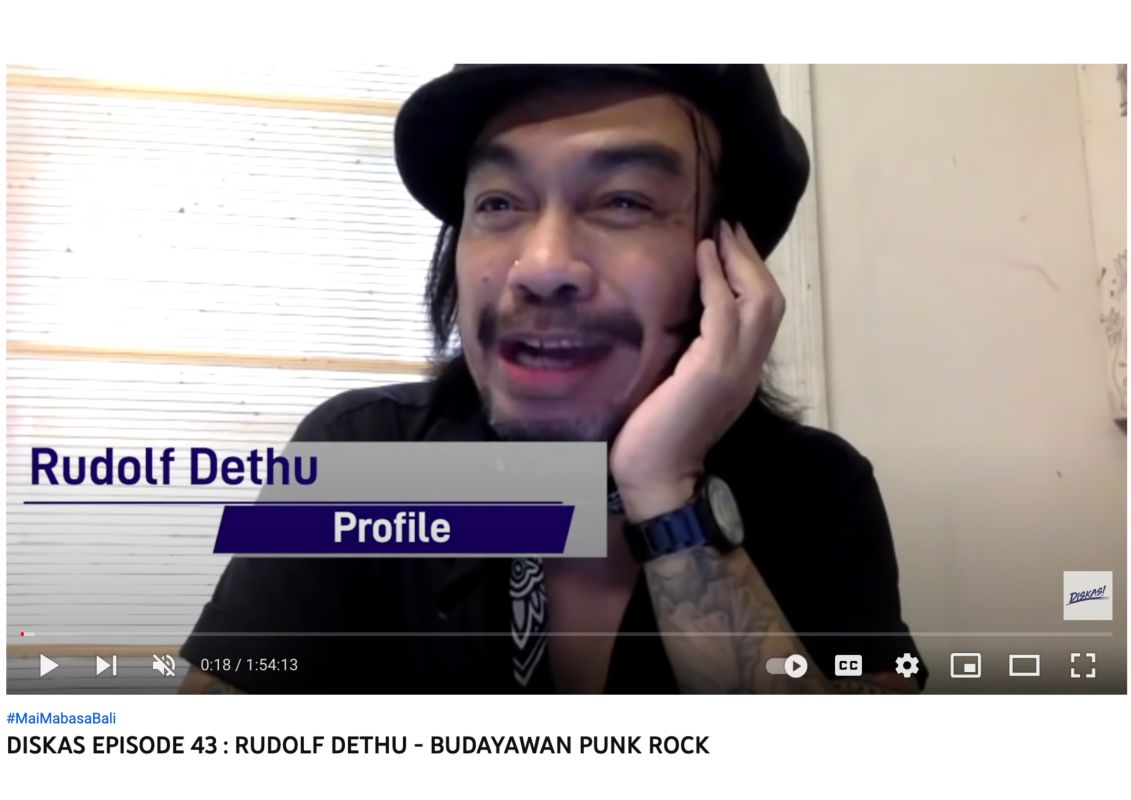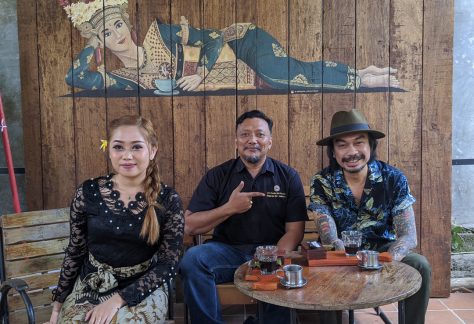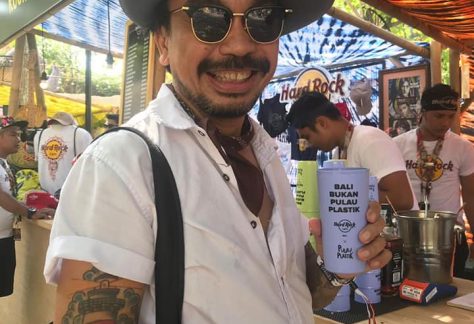
A new book telling the story of non-traditional music in Bali over the past four decades was released and launched at Antida Arts in Sanur last weekend. The book called Blantika | Linimasa (Scene | Timeline) is curated and edited by local rock ‘n’ roll luminary, long-time beat magazine contributor and former Superman is Dead manager, Rudolf Dethu. It’s written in Bahasa by a group of writers; Alfred Pacifico Ginting, Anton Muhajair, Gede Roby Supriyanto and Dethu, and looks into the way that pop, rock and every other modern music form, outside the traditional Balinese music sphere, has evolved on the island. There have been many highs and lows on the way to where local music finds itself now but has it actually made it all the way?
We asked Dethu, to begin with, whether it has been easy for non-traditional music forms to find a foothold in the local music scene.
Dethu: It’s never been easy. Especially due to almost no support from the government. The government focused more on traditional arts—gamelan and all that—rather than modern music (they are scared this form of art will be gone soon if they don’t support it). So basically the non-traditional music could live and survive simply by the support from public enthusiasm, young people to be precise. This pop culture has never been taken seriously. Meanwhile young people, most of them felt sick to be dictated to respect the old tradition. They want something different, something that really represents them, something cool, not boring, up to date, which they find it in pop culture, modern music.
Where did the original music scene (people playing their own music and not doing covers) first spring up, Denpasar or Kuta?
Dethu: Denpasar. In 1970s there was already a band called, Band Putra Dewata. According to one source, they even sold 100 thousand albums (with their original songs) during their heyday. And in the late 90s there was this underground scene—yes, original songs also—which was responded to enthusiastically by the young audience of Denpasar. Not long after that, the underground scene expanded to Kuta. Firstly started by The Beat mag with its legendary Beat Rock Fest, in 2001, if I’m not mistaken. It was historical because never before local bands with original songs were allowed or welcome to play at clubs in Kuta/Seminyak. The first Beat Rock Fest at now-defunct Aina Bar was historic.
You’ve done your research on the matter. Who was the first original band to have success on the island?
Dethu: As I mentioned earlier, it was Band Putra Dewata. Could sell, according to “Bali Menggugat” book by Putu Setia, 100 thousand copies. But the first band who succesfully broke national mainstream success was Superman Is Dead (which I used to manage).

Are there any particular parts of the book that stand out for you? Like, people, stories or moments that stick out in your mind?
Dethu: I personally like the pages of Balibali mostly because after I dug deeper, I found so many interesting facts. I guess the general public will also be surprised to finally discover what really was going on back in the day in Balibali world. Oh, I’m not saying that the Balinesia part isn’t interesting. It’s just because I’m the insider so I pretty much know what’s going on.
Do you think there is a reason why punk rock has had so much traction over the years in Denpasar? And are there any changes happening nowadays?
Dethu: I think the popularity of Superman Is Dead nationally—and internationally—has created a significant impact (I bet SID in the very near future will become one out of the three biggest rock bands in Indonesia). Kids become inspired by the success story of SID. This phenomenon even expanded to an anomaly which punk rock and its subgenre is now the strongest music existing in Bali. Not bubblegum pop, but the strongest music is now punk rock and its subgenres and also rock in general. Haha.
Any changes happening nowadays, well, SID have inspired the Bali youth to build their own bands. Punk rock has opened many doors.
Has the web and social media had much of an effect on the local music scene?
Dethu: Definitely. Bali is relatively faraway from Jakarta, the music centre of Indonesia. Back in the day bands had to take a bus (due to the fact that they couldn’t afford taking a plane), 24 hours drive to perform in Jakarta. So exhausting and would ruin your performance because you were tired, you weren’t at your best shape. Some tried their luck by moving there so they can get more exposure from the press and music moguls. But after the heavy penetration of social media, it’s been very helpful to Bali. Bali bands don’t have to travel to Jakarta just to be noticed. Or have to send tons and tons of promo kits to media in Jakarta. Socmed has made things more financially efficient. Any new bands can relatively have the same chance to be noticed, as long as they are connected to socmed.
We’ve all heard of the local bands Superman is Dead, Navicula, Psychofun etc. Is there a new breed of band ready to knock down the door? Any original bands to keep an eye on?
Dethu: Discotion Pill, they are not new. But people need to give them more serious attention. They are brilliant. Nymphea, also not new but they get so much better and tighter as time goes by. Painful by Kisses, not too new but these days have one of the strongest followers in rock scene. The new one who have created a big buzz are of course Nosstress. In their early twenties and very talented. Not to forget also Dialog Dini Hari, a new band consisting of veterans.
Do you think the local music scene has really established itself now or does it still have somewhere further to go?
Dethu: Yes. Indeed. It’s really strong right now. Lots of cool bands. The quality gets better and better. However, there aren’t enough stages, though. They need more outlets to express themselves plus to show people how good they are so the public won’t see the same bands every time. Plus, same as what happens in other parts of the world, the record sales are suffering. The money issue is still a big problem.
Where’s the book available?
Dethu: You can get it at Warung Yaya, Sanur, or Antida, or order online. It’s really cheap, only Rp 10 thousand. I’m not trying to make money here. Just wanna share interesting stories about non-trad Bali music. It’s not just a book. It’s a history book, mind you.
*The article is borrowed—with respect—from The Beat (Bali) # 303, Jan 26 – Feb 02, 2012






